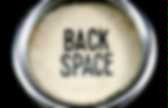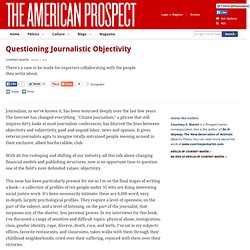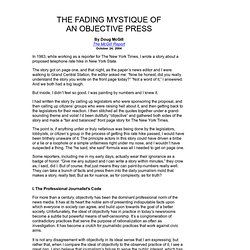

Objective Journalism. I don't know if this has been questioned yet, and i don't intend to read the hundreds of comments to find out. if i'm making an already-covered point please feel free to point it out to me, or simply ignore it. my question is this... who exactly is ryan winterhalter? As said i didn't read through the comments fully, but i did try my hand at a little investigation (here on 1up anyway) and i did read ign and gamespot reviews as sources of comparison. let's address that first. while neither publication spoke very well about DNF, they both provided detailed writeups about the game behind the controversy with plenty of information and specific examples of both the pros and cons. ryan's review was not handled with the same care. if you've read this far, sincere thanks. please share your thoughts; i barely did what could be called even cursory research, and community insight and differing points of view are more than welcome.
Completely Objective Journalism. I try not to comment on global warming stories, but The Washington Post put a story on today’s front page that is so monumentally bad that I can’t pull myself away from the keyboard. The premise of the story by Juliet Eilperin is well-expressed by its headline: “Carbon Output Must Near Zero To Avert Danger, New Studies Say”. Eilperin prominently quotes Carnegie Institution senior scientist Ken Caldeira, co-author of one of the studies promoted by the article, who says: “The question is, what if we don’t want the Earth to warm anymore?”
Questioning Journalistic Objectivity. Journalism, as we've known it, has been mourned deeply over the last few years.

The Internet has changed everything. "Citizen journalism," a phrase that still inspires dirty looks at most journalism conferences, has blurred the lines between objectivity and subjectivity, paid and unpaid labor, news and opinion. It gives veteran journalists agita to imagine totally untrained people messing around in their exclusive, albeit hardscrabble, club. With all this reshaping and shifting of our industry, all this talk about changing financial models and publishing structures, now is an opportune time to question one of the field's most defended values: objectivity. This issue has been particularly present for me as I'm on the final stages of writing a book -- a collection of profiles of ten people under 35 who are doing interesting social justice work.
Objectivity in Journalism. DAVID BROOKS There is some dispute about whether objectivity can really exist.

How do we know the truth? Well, I’m not a relativist on the subject. I think there is truth out there and that objectivity is like virtue; it's the thing you always fall short of, but the thing you always strive toward. And by the way, I think that opinion journalists have to be objective just as much as straight reporters. Opinion journalists, too, have to be able to see reality wholly and truly. "The ideal of objectivity" Objectivity, a mainstay to modern journalism, was not always present in early American newspapers — nor was it expected. “Discovering the News: A Social History of American Newspapers” considers objectivity’s role in American newspapers from the early days of the Penny Press to the 1970′s. Author Michael Schudson‘s introduction lays the groundwork for what will become the emergence and expectation of objectivity in American newspapers.
Schudson focuses the development of objectivity around one of journalism’s greatest newsworthy subjects — war. Pre-World War I (Definition of objectivity: “Facts are not human statements about the world, but aspects of the world itself.”) Partisanship was standard fare in early American papers. Post-World War I (Definition of objectivity: “Allegiance to rules and procedures created for a world in which even facts were in question.”) The Fading Mystique of an Objective Press. It is worth noting that non-partisan (i.e., objective) reporting coexisted easily in the same penny papers with such pungent sensationalism.

“Neutrality will sleep with anyone,” as the saying goes. Right there at the creation of the modern press, paradoxes abounded. Bennett and other penny publishers touted nonpartisanship, yet on issues that were universally applauded the pennies were rabid advocates. Bennett for example was always super patriotic and always proslavery, both being conducive to pleasing his readers and thus to producing profits. During the 20th century, the ideal of objectivity in news coverage went from strength to strength.
Of the Dawn of “Objective” Journalism. How "Objectivity" Came to Define American Journalism. Re-Thinking Objectivity. Journalistic Ethics, Objectivity, Existential Journalism, Standpoint Epistemology, and Public Journalism - Journal of Mass Media Ethics - Volume 16, Issue 1. He Said, She Said, and the Truth. But while balance may be necessary to mediating a dispute between teenage siblings, a different kind of balance — some call it “false equivalency” — has come under increasing fire. The firing squad is the public: readers and viewers who rely on accurate news reporting to make them informed citizens. Simply put, false balance is the journalistic practice of giving equal weight to both sides of a story, regardless of an established truth on one side.
And many people are fed up with it. They don’t want to hear lies or half-truths given credence on one side, and shot down on the other. They want some real answers. “Recently, there’s been pressure to be more aggressive on fact-checking and truth-squading,” said Richard Stevenson, The Times’s political editor.